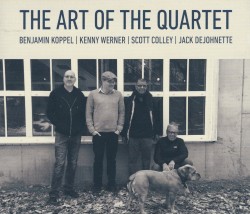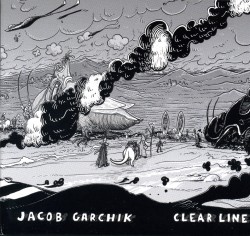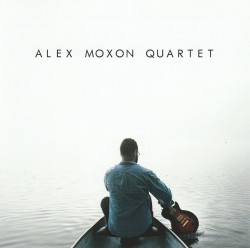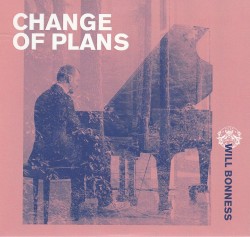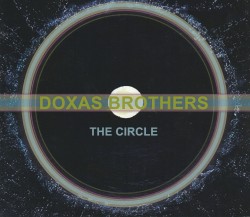Although seemingly limited in expressive textures by the trumpet’s size and construction, composers and players have steadily expanded the brass instrument’s range and adaptability during the past half century. As more have investigated the possibilities in improvised and aleatoric music, the definition of brass tone has modified. Concurrently the makeup of an acceptable ensemble connected with trumpet tones has evolved as well and each of these out-of the-ordinary outings demonstrates how musical definition can shift from session to session.
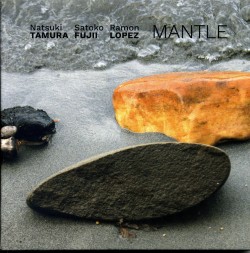 Longtime partners, Japanese trumpeter Natsuki Tamura and pianist Satoko Fujii have played in many configurations from duo to big band, but Mantle (NotTwo MW 10003-2 nottwo.com) is unique in that they collaborate with Spanish drummer Ramon Lopez in a trio featuring the trumpeter in the role usually taken by a reed player. Throughout the nine tracks as well, it’s Tamura’s choked or splayed capillary discursions which are most aggressive, with the pianist and drummer equally complementary. Brassy flutter tonguing, open horn accelerations, half-valve effects, kazoo-like blats and inner body tube excavations are Tamura’s common strategies. Meanwhile, as on Metaphors, the pianist’s careful arpeggios and the drummer’s contrapuntal shuffles preserve linear output. An equal line of this triangular creation, Lopez often sets up narratives with pops, ruffs or clanging cymbal work. As for Fujii, as demonstrated on Straw Coat, she skillfully creates a gentle impressionistic exposition with soundboard echoes and then turns to broken-chord power to counter Tamura’s freylekhs-like brassy interjection. Other times, as on Encounter, her dynamic vibrations give impetus to a narrative dominated by Lopez’s resounding rolls and fluid paradiddles plus Tamura’s brassy screeches. Still it’s the penultimate Autumn Sky which puts the trio’s skills in boldest relief. Beginning in a balladic mode with metronomic keyboard patterns and a brass part that is muted and moderated it subsequently creates andante excitement via grainy distended brass work and kinetic piano crunches and clusters from Fujii.
Longtime partners, Japanese trumpeter Natsuki Tamura and pianist Satoko Fujii have played in many configurations from duo to big band, but Mantle (NotTwo MW 10003-2 nottwo.com) is unique in that they collaborate with Spanish drummer Ramon Lopez in a trio featuring the trumpeter in the role usually taken by a reed player. Throughout the nine tracks as well, it’s Tamura’s choked or splayed capillary discursions which are most aggressive, with the pianist and drummer equally complementary. Brassy flutter tonguing, open horn accelerations, half-valve effects, kazoo-like blats and inner body tube excavations are Tamura’s common strategies. Meanwhile, as on Metaphors, the pianist’s careful arpeggios and the drummer’s contrapuntal shuffles preserve linear output. An equal line of this triangular creation, Lopez often sets up narratives with pops, ruffs or clanging cymbal work. As for Fujii, as demonstrated on Straw Coat, she skillfully creates a gentle impressionistic exposition with soundboard echoes and then turns to broken-chord power to counter Tamura’s freylekhs-like brassy interjection. Other times, as on Encounter, her dynamic vibrations give impetus to a narrative dominated by Lopez’s resounding rolls and fluid paradiddles plus Tamura’s brassy screeches. Still it’s the penultimate Autumn Sky which puts the trio’s skills in boldest relief. Beginning in a balladic mode with metronomic keyboard patterns and a brass part that is muted and moderated it subsequently creates andante excitement via grainy distended brass work and kinetic piano crunches and clusters from Fujii.
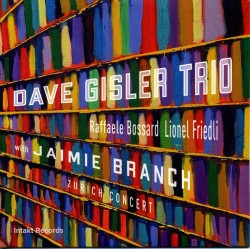 Another variation on the theme of timbre reorientation is Zurich Concert (Intakt CD 357 intaktrec.ch), a live program where American trumpeter Jaimie Branch joins the trio of Swiss guitarist Dave Gisler for the first time. Her vigorous drive, propelled with a touch of greasy blues, easily latches onto the sensibility of the guitarist, bassist Raffaele Bossard and drummer Lionel Friedli, whose playing encompasses rock energy. The trumpeter’s foreground/background role is best illustrated on One Minute too Late. Picking up from the short, shaking and rattling track that precedes it, this tune evolves into a solid narrative of horizontal brass tones decorated with Gisler’s flanges and frails. When the guitar solo transforms into a gentling theme elaboration with both folk and jazz inflections, the timbral decorations are from Branch’s plunger tones. Meanwhile, movement is provided by a bowed bass line and cymbal crashes. Throughout the set, cadences are further informed by rock sensibility. If Gisler’s slashing frails and echoing string slides are often staccato and distorted, their origins are British hard rock atop jazz perceptions. When a groove is established coupling fretted string echoes, a double bass pulse and drum backbeats, low-pitched bass colouration joins the guitarist’s slurred fingering and the trumpeter’s brass smears to confirm this is no pop-rock CD. This maxim is further demonstrated on the smeary, scatological Better Don’t Fuck with the Drunken Sailor. A blues, it combines Gisler’s upward string shakes and stutters that could come from Led Zeppelin with Branch’s plunger mute extension which dates to Duke Ellington’s Jungle Band. The group also detours into post-modernism on Cappuccino, where the vocalized title is repeated and distorted by looping electronics and the stop-time narrative enhanced with guitar flanges and trumpet plunger growls.
Another variation on the theme of timbre reorientation is Zurich Concert (Intakt CD 357 intaktrec.ch), a live program where American trumpeter Jaimie Branch joins the trio of Swiss guitarist Dave Gisler for the first time. Her vigorous drive, propelled with a touch of greasy blues, easily latches onto the sensibility of the guitarist, bassist Raffaele Bossard and drummer Lionel Friedli, whose playing encompasses rock energy. The trumpeter’s foreground/background role is best illustrated on One Minute too Late. Picking up from the short, shaking and rattling track that precedes it, this tune evolves into a solid narrative of horizontal brass tones decorated with Gisler’s flanges and frails. When the guitar solo transforms into a gentling theme elaboration with both folk and jazz inflections, the timbral decorations are from Branch’s plunger tones. Meanwhile, movement is provided by a bowed bass line and cymbal crashes. Throughout the set, cadences are further informed by rock sensibility. If Gisler’s slashing frails and echoing string slides are often staccato and distorted, their origins are British hard rock atop jazz perceptions. When a groove is established coupling fretted string echoes, a double bass pulse and drum backbeats, low-pitched bass colouration joins the guitarist’s slurred fingering and the trumpeter’s brass smears to confirm this is no pop-rock CD. This maxim is further demonstrated on the smeary, scatological Better Don’t Fuck with the Drunken Sailor. A blues, it combines Gisler’s upward string shakes and stutters that could come from Led Zeppelin with Branch’s plunger mute extension which dates to Duke Ellington’s Jungle Band. The group also detours into post-modernism on Cappuccino, where the vocalized title is repeated and distorted by looping electronics and the stop-time narrative enhanced with guitar flanges and trumpet plunger growls.
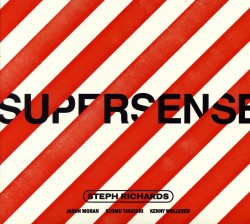 If loops are one way to imaginatively add originality to trumpet-oriented jazz, Canadian-in-Brooklyn Steph Richards has come up with an even more outlandish statement. The nine tracks on Supersense (Northern Spy NS 130 northernspyrecs.com) are each named for a specific scent created for the trumpeter by fragrance artist Sean Raspet. A scratch-and-sniff card is included in the package to see if the music reflects the smells and vice versa. Olfactory connections may be up to individual debate. More compelling is the dynamic expressed between Richards’ downplayed brass undulations, the resonating drums and strewn water tones she projects with the sensitive accompaniment provided by Americans, pianist Jason Moran, bassist Stomu Takeishi and drummer Kenny Wollesen. Stroked internal strings and stopped keys from the piano, languid double bass strokes and drum-top buzzes remain atmospherically low key and purposeful, as mewling and trilling trumpet splutters create contrapuntal theme extrapolations. That makes tracks like Canopy and Metal Mouth, where Richards unexpectedly exhales strident bursts of staccato snarls, stand out. Her splayed textures, plunger asides and muted slurs are expressively bright or gritty as the situation demands. Overall, the few instances of reveille-like bugling or lively brassy buzzing are secondary to the comprehensive integration of brass, string and percussion timbres. Like quality perfume, Supersense makes its presence felt through subtlety and understatement.
If loops are one way to imaginatively add originality to trumpet-oriented jazz, Canadian-in-Brooklyn Steph Richards has come up with an even more outlandish statement. The nine tracks on Supersense (Northern Spy NS 130 northernspyrecs.com) are each named for a specific scent created for the trumpeter by fragrance artist Sean Raspet. A scratch-and-sniff card is included in the package to see if the music reflects the smells and vice versa. Olfactory connections may be up to individual debate. More compelling is the dynamic expressed between Richards’ downplayed brass undulations, the resonating drums and strewn water tones she projects with the sensitive accompaniment provided by Americans, pianist Jason Moran, bassist Stomu Takeishi and drummer Kenny Wollesen. Stroked internal strings and stopped keys from the piano, languid double bass strokes and drum-top buzzes remain atmospherically low key and purposeful, as mewling and trilling trumpet splutters create contrapuntal theme extrapolations. That makes tracks like Canopy and Metal Mouth, where Richards unexpectedly exhales strident bursts of staccato snarls, stand out. Her splayed textures, plunger asides and muted slurs are expressively bright or gritty as the situation demands. Overall, the few instances of reveille-like bugling or lively brassy buzzing are secondary to the comprehensive integration of brass, string and percussion timbres. Like quality perfume, Supersense makes its presence felt through subtlety and understatement.
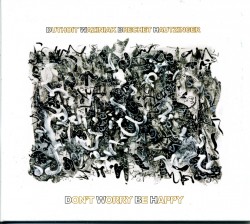 In the right hands and mouth, trumpet tones also ally or contrast with experimental vocals and electronics, as well as instrumental techniques. That’s what happens on Don’t Worry Be Happy (Intrication Tri 002 thierrywaziniak.wixsite.com) as veteran Austrian brass experimenter Franz Hautzinger evokes his strained flutters alongside out-of-the-ordinary contributions from a trio of French players: percussionist Thierry Waziniak, guitarist Pascal Bréchet and the clarinet and voice of Isabelle Duthoit. There are times, as on Sables symphoniques, for instance, when Hautzinger’s growls and gurgles are the mirror image of Duthoit’s yelping shrieks and burbling trills, but that’s after his horizontal bites have established brass identity. More commonly, the interaction involves unearthing blurry or bellicose brass timbres from unexpected places to work alongside shrill reed multiphonics, as well as dissected string flanges and ratcheting percussion, all of which owe as much to electronic processing as acoustic qualities. This is particularly noticeable on Dans le ventre de la baleine, where irregular drum chops and jangling guitar runs are further distended with on/off voltage shakes, as high-pitched trumpet peeps and reed trills preserve the narrative movement. Moving from discursive to distinct sequences with knife-sharp guitar whines, percussion buzzing, panting vocalese and blurry trumpet variations, the program is resolved at midpoint with the extended and concept-defining Souffle hybride. With electronic wave forms soaring throughout, the sound field becomes louder as the narrative intensifies with diffuse guitar twangs and drum clip clops. Duthoit and Hautzinger construct a melded duet from clarinet chicken clucking and half-valve barks. Vocal gurgles and retches alongside back-and-forth brass vamps finally relax the track into narrative coherence.
In the right hands and mouth, trumpet tones also ally or contrast with experimental vocals and electronics, as well as instrumental techniques. That’s what happens on Don’t Worry Be Happy (Intrication Tri 002 thierrywaziniak.wixsite.com) as veteran Austrian brass experimenter Franz Hautzinger evokes his strained flutters alongside out-of-the-ordinary contributions from a trio of French players: percussionist Thierry Waziniak, guitarist Pascal Bréchet and the clarinet and voice of Isabelle Duthoit. There are times, as on Sables symphoniques, for instance, when Hautzinger’s growls and gurgles are the mirror image of Duthoit’s yelping shrieks and burbling trills, but that’s after his horizontal bites have established brass identity. More commonly, the interaction involves unearthing blurry or bellicose brass timbres from unexpected places to work alongside shrill reed multiphonics, as well as dissected string flanges and ratcheting percussion, all of which owe as much to electronic processing as acoustic qualities. This is particularly noticeable on Dans le ventre de la baleine, where irregular drum chops and jangling guitar runs are further distended with on/off voltage shakes, as high-pitched trumpet peeps and reed trills preserve the narrative movement. Moving from discursive to distinct sequences with knife-sharp guitar whines, percussion buzzing, panting vocalese and blurry trumpet variations, the program is resolved at midpoint with the extended and concept-defining Souffle hybride. With electronic wave forms soaring throughout, the sound field becomes louder as the narrative intensifies with diffuse guitar twangs and drum clip clops. Duthoit and Hautzinger construct a melded duet from clarinet chicken clucking and half-valve barks. Vocal gurgles and retches alongside back-and-forth brass vamps finally relax the track into narrative coherence.
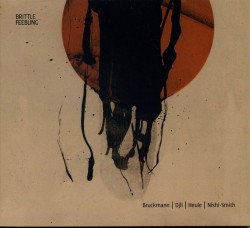 Using a similar strategy and instrumentation, but with acoustic intonation, is Brittle Feebling (Humbler 006 heule.us) by a quartet of Bay Area players: trumpeter Tom Djll, Kyle Bruckmann on oboe and English horn, koto player Kanoko Nishi-Smith and Jacob Felix Heule using only a floor tom. Acoustic is merely one facet of these reductionist improvisations however, since expected tones are eschewed for the most part. The minimalist interface is adhered to so closely in fact, that it’s often impossible to attribute a single tone to one identifiable instrument. For the most part, koto strokes are intermittent, with short hammer-like clanks as present as strumming. Rarely harmonized, Bruckmann and Djll constantly overblow with squealing whines from the reeds and bell-against-mike metallic squeals from the trumpet. Underscoring this are concentrated abrasions from the floor tom that become shaking drones that sometimes replicate hurdy-gurdy continuum. Although there are brief tuneful hints emanating from the reedist’s and trumpeter’s usually dissonant narratives, the horns and percussion eventually meld into a massive blare that dominates the entire track. This density is only lessened when thin koto string plinks are gradually revealed. Careful listening though, confirms that timbral striations from the instruments during the performances mean the collective result is as fluid as it is brittle.
Using a similar strategy and instrumentation, but with acoustic intonation, is Brittle Feebling (Humbler 006 heule.us) by a quartet of Bay Area players: trumpeter Tom Djll, Kyle Bruckmann on oboe and English horn, koto player Kanoko Nishi-Smith and Jacob Felix Heule using only a floor tom. Acoustic is merely one facet of these reductionist improvisations however, since expected tones are eschewed for the most part. The minimalist interface is adhered to so closely in fact, that it’s often impossible to attribute a single tone to one identifiable instrument. For the most part, koto strokes are intermittent, with short hammer-like clanks as present as strumming. Rarely harmonized, Bruckmann and Djll constantly overblow with squealing whines from the reeds and bell-against-mike metallic squeals from the trumpet. Underscoring this are concentrated abrasions from the floor tom that become shaking drones that sometimes replicate hurdy-gurdy continuum. Although there are brief tuneful hints emanating from the reedist’s and trumpeter’s usually dissonant narratives, the horns and percussion eventually meld into a massive blare that dominates the entire track. This density is only lessened when thin koto string plinks are gradually revealed. Careful listening though, confirms that timbral striations from the instruments during the performances mean the collective result is as fluid as it is brittle.
There are plenty of roles for trumpets in conventional ensembles. Yet each of these tone-explorers – and the groups in which they play – outlines other ways to use the brass instrument’s properties.
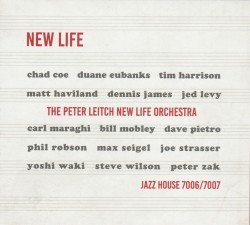 New Life
New Life

